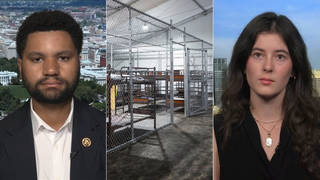As the United Nations climate summit gets underway in Qatar this week, a new study has found wealthy nations, including the United States, have fallen short on vows to give billions in aid to poorer countries in order to help them fight climate change. While $30 billion in new aid was pledged over a two-year period ending this year, Monday’s report by the London-based International Institute for Environment and Development found less than $24 billion had been committed, most of it in loans that would have to be repaid. The climate talks come on the heels of a United Nations report that found the concentration of greenhouse gases has jumped 20 percent since 2000. During a news conference Monday, European Union negotiator Artur Runge-Metzger said Europe would be willing to ramp up its efforts to curb emissions if other countries would follow suit.
Artur Runge-Metzger: “We are ready to step up our ambition from 20 to 30 percent if other major economies would also move up to the higher end of their pledges. This offer is still on the table, and it will stay on the table even after Doha. But in terms of making the international commitment of 30 percent, that requires a conversation with our partners around the world, in particular the major economies. The United States already clearly says that it cannot move; we do not think there would be any productive discussion on upping individual countries’ targets in Doha.”











